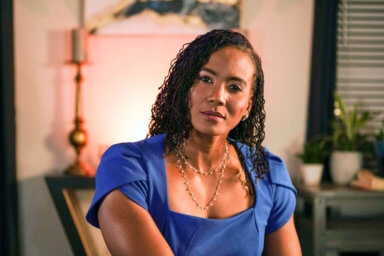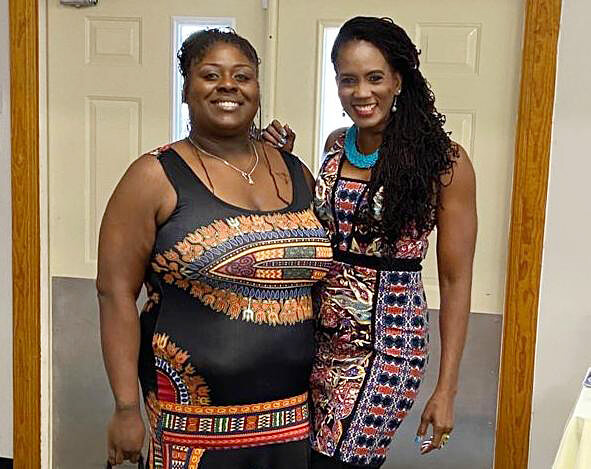Breaking ‘cycle of shame’ in Caribbean women of color to achieve goals

Many Caribbean women of color are trapped in a ‘cycle of shame’ which they must break in order to achieve their full potential.
So says former stage and screen actress turned Life Coach and Fitness Trainer, Denise Hunt, owner – operator of fitness company SizzleFit Faith and Fitness.
According to Jamaican-born Hunt, who also hosts the popular instagram podcast show, Random Thoughts Live, darker skinned women of color from the Caribbean are faced with a unique combination of circumstances which often render them paralyzed with feelings of shame and inadequacy and the inability to act on their dreams. That paralysis also prevents them from seeking the help they need, resulting in the passing on of these issues to succeeding generations, who then perpetuate the cycle.
“From my own personal experiences growing up in Jamaica, I can attest to the fact that for many women of color, the cycle of shame starts early and once it takes hold, it’s so hard to let it go,” she said. “Women of color everywhere suffer from the cycle as well, but women in the Caribbean have the additional burden of inhabiting societies where we are the majority in number, and yet are still often treated as second class citizens. In most Caribbean countries, the poorest in the population are almost invariably black, and that triple strike of being black, female and poor can be potentially devastating.”
Hunt was born into humble circumstances in the inner city community of Allman Town in Kingston. It was when she attained a scholarship to one of Jamaica’s most prestigious all female high schools, The Queen’s School, that she recalls consciously experiencing shame for the first time.
“That was when I first began to experience feelings of inadequacy in the presence of the demographic that was prominent at my school – mostly wealthy, mostly light skinned girls who lived in homes with both parents, and where both parents shared the same last name. None of that was my reality. And then I made an emotional connection to all of that when one day a schoolmate of Asian descent said to me ‘You know Denise, you are cute- for a dark skinned girl.’ And I realized that while I was getting a compliment for my facial features, it was really a backhanded slap… I couldn’t celebrate it because it was being made clear that being dark skinned was somehow a bad thing. I was ‘the other.’ I was less than.”
An excellent student, Hunt graduated from Queen’s and was offered the opportunity to pursue acting at Jamaica’s Edna Manley College for the Visual and Performing Arts. However, the economics of her family situation and the need to contribute to the household’s income made higher education an impossibility. She entered the corporate work force but took the initiative to contact some of Jamaica’s best known theatrical producers, seeking the chance to audition for their productions. She soon found herself an actress in high demand, gracing stages in Jamaica and then internationally, in award winning plays such as David Heron’s Against His Will, Jambiz International’s Dirty Diana and Ed Wallace’s Boeing Boeing among many others.

She made her feature film debut in a scene stealing role opposite Oscar nominee Angela Bassett and Taye Diggs in the hit film How Stella Got Her Groove Back, and was soon hosting not one, but two television shows on Jamaica’s TVJ network- The Entertainment Report and Rising Stars.
Yet with all her success, Hunt realized that something remained seriously wrong- that she felt, in her words, “Like an imposter.” Looking back now, she says realizes that like many women of color she has known, she was unable to embrace her career successes due to her cycle of shame.
“Women of color are often treated professionally in one of two ways- you are either totally ignored or you fall victim to the politics of pity. So people give you an opportunity, and they expect you to be grateful, while at the same time making it clear that said opportunity is not being given because you are talented or deserving- but out of pity. The attitude is ‘You poor little underprivileged thing… Here’s your shot. Now be quiet and be happy about it.’ And so the feeling of shame and inadequacy remains.”
The traditional stoicism of Caribbean society does not help.
“In the Caribbean, young women, especially those who are black and in poverty, are often taught to be quiet about horrible things that happen to them. They are somehow made to feel that it was their fault and that speaking about it will bring greater shame onto the family and the community, making it all worse. They are told to be tough and strong and to bear it. So they suffer in silence, greatly to their detriment, many only seeking help if they eventually emigrate here to the USA or another country where openness is encouraged and there is infrastructure to help them.”
In Hunt’s case, the turning point came when she literally thought she might not survive if she didn’t seek help. Once she did, things turned around dramatically.
She became a certified fitness coach in 2010, a born again Christian in 2012 and a certified life coach in 2019. She left acting to focus on physical and mental wellness for both herself and others.
In all her coaching, she emphasizes the symbiotic relationship between mind, body and spirit and is passionate about using her own story to help other women of color break the cycle of shame, describing it as “Vital to the survival of our dreams and, consequently, our black families.”
Denise Hunt hosts Random Thoughts Live every Thursday at 8 pm EST on her instagram site @denisesizzlefithunt.
DENISE HUNT’S FIVE ESSENTIAL STEPS TO BREAKING THE CYCLE OF SHAME:-
1) Acknowledge and accept what will happen if you DON’T break the cycle. Ask yourself what’s the worst thing that could possibly happen if you don’t. And know that it will probably be even worse than that.
2) Ask for help. Defy everything and everyone who says otherwise.
3) Find an Accountability Partner. This is someone who sees you for you, and who will support you through the entire process, good days and bad, “Because you will have both.”
4) Stay consistent in your healing. You did not arrive at where you are overnight. So it will take time to become better. Be patient. Give yourself grace.
5) Say these words to yourself every day- “I forgive you.” It is important to forgive yourself for whatever you think you did to be where you are.
Most importantly, once you are on the road to healing, pay it forward and help someone else, just as someone helped you. It is vital to give back to continue the cycle of healing.




